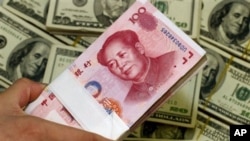A bill aimed at punishing China for fixing its exchange rate gained ground in the U.S. Congress last week, as lawmakers say diplomacy on the issue has failed. But Beijing insists that a very gradual strengthening of its currency would be best for its economy and the rest of the world.
Holding ground
Chinese Premier Wen Jiabao has argued that a 20 to 40 percent appreciation of the yuan would force many Chinese exporters to shut down. That, he said, is partly why Beijing is holding its ground against U.S. pressure to let the currency strengthen rapidly.
The yuan has risen about 2 percent since June when Beijing broke its peg with the dollar, but some international economists say it is undervalued by as much as 30 percent. The United States says 2 percent is not enough because an undervalued currency makes Chinese exports unfairly cheap and contributes to the wide U.S. trade deficit.
Call for stronger Yuan
The issue has festered for several years, despite calls from the United States and other countries for a stronger yuan. Last week, the U.S. House of Representatives passed a bill that could open the way for punitive tariffs on products from China - the United States' second biggest trading partner.
There is debate on how a rapid appreciation of the yuan would affect the Chinese economy.
Lee Jong-wha, chief economist of the Asian Development Bank, says when exports fall, jobs could go.
"The important issue is how the export industry can accumulate profit and create jobs continuously," Lee said. "In China's case, we all understand that the export sector plays a major role in creating jobs, especially for the young people, so it needs to continue."
Expanding exports
By many estimates, China's economy needs to grow by at least 8 percent annually for it to be able to create jobs for millions of new workers every year. For 30 years, China has fueled much of its growth by aggressively expanding its manufacturing exports.
A U.S. Federal Reserve study last year found that had the yuan appreciated at 10 percent a year since mid-2005, Chinese exports would have been roughly 30 percent lower today.
On the other hand, a stronger yuan allows China to pay less for imported raw materials, such as oil and gas, minerals, and components made in other countries that are used for Chinese electronics exports. That could benefit both Chinese consumers and manufacturers.
Yuan appreciation
William Cline is an economist at the Peterson Institute for International Economics in Washington, D.C. He says his analysis shows that a faster appreciation would significantly cut China's trade surplus or the difference between what it sells to, and what it buys from, its trading partners.
"I say that if China's currency were to rise by 10 percent that would reduce their surplus by $170 billion to $250 billion," said Cline. "It would reduce the U.S. deficit by somewhere between $20 billion to $60 billion."
But some economists say other elements of economic growth might compensate for any slowdown in exports. Last year, slower exports dragged down China's gross domestic product growth. But investments accounted for 92 percent of GDP growth and domestic consumption more than 50 percent. And in 2009, the economy still grew 8.7 percent.
Stephen Schwartz is an economist at the bank BBVA (Banco Bilbao Vizcaya Argentaria) in Hong Kong.
"Currency appreciation is just one part of the overall package to rebalance the Chinese economy," Schwartz said. "And we're slowly seeing it in the numbers, a rotation away from this reliance on export-led and investment growth to the domestic consumer taking over, and over time it's going to benefit the exports from the U.S."
Forewarning
Some U.S. business groups warn that legislation to punish China would only hurt trade ties and destroy U.S. jobs.
However, political analysts in the U.S. say the House of Representatives' bill is unlikely to pass in the Senate when it comes to a vote, probably late this year. But a Treasury Department report later this month could ratchet up the currency dispute if it designates China as a "currency manipulator."
Lee of the Asian Development Bank says as China continues to grow quickly, the only way for the yuan to go is up.
"Even if they don't appreciate the nominal exchange rate, inflation will be higher," Lee added. "So eventually, real exchange rate will be appreciated so the trade balance will decline. This is what happened to many Asian exporters."
Domestic market
Economists say this is because keeping the yuan too weak will fuel inflation in China, which ultimately makes domestic goods less competitive.
But Lee says that even if China lets the yuan rise faster, it does not guarantee an immediate correction in global trade imbalances.
He notes that after the yen began to rapidly appreciate in 1985, Japan continued to maintain a strong trade surplus with the United States – and does so even today. The yen has more than doubled in value against the dollar since then.




